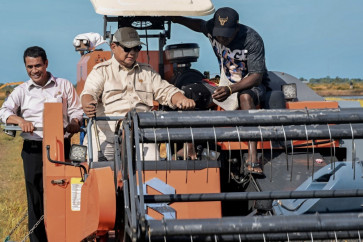Popular Reads
Top Results
Can't find what you're looking for?
View all search resultsPopular Reads
Top Results
Can't find what you're looking for?
View all search resultsIndonesia and the Rohingya
Beginning in June, there emerged reports of ugly racial violence ocurring in Myanmar
Change text size
Gift Premium Articles
to Anyone
B
eginning in June, there emerged reports of ugly racial violence ocurring in Myanmar. The Rohingya, a Muslim-denominated ethnic group located in the western state of Rakhine, have suffered considerably, and there have been calls by the United Nations and human rights groups around the world for the Myanmar government to take stronger measures to ensure the safety of the minority group.
So far, the Myanmar government has refused to even acknowledge the actual scale of the damage done, in terms of the lives lost and the reported 100,000 people who have been displaced.
Indonesia has had a long-standing friendship with Myanmar, and now finds itself in a curious position when it comes to the plight of the Rohingya. Senior government officials, such as Foreign Minister Marty Natalegawa, have been critical.
According to Marty: “Our stance is clear: we refuse and are against the discriminatory treatment of anyone, anywhere. We cannot tolerate this, and we are asking the Myanmar government to manage this issue as Myanmar moves forward toward democratization.”
Sensing a mission that plays well with the domestic constituency, many jumped onto the criticizing Myanmar bandwagon, and argued that the House of Representatives should conduct its own diplomacy by sending House of Representatives (DPR) members to meet their counterparts in Myanmar.
Just why Indonesia now feels compelled to act upon the plight of a minority outside its own borders is a question worth posing, especially when one considers our history in places such as Timor Leste, Aceh and Papua.
In each of those secessionist conflicts, past governments, and the current administration, have made few efforts, if any, to recognize the human rights abuses that occurred, or make amends with innocent
victims of the past.
One could argue this is ancient history and it is not worth discussing (at least, this is what the national government would like us to believe). Yet the fact remains, scores of eyewitness accounts of senseless killings and torture tell us of tragedies for which we should feel, at the very least, the pangs of national shame. So far, that does not seem to be the case.
For a nation that has prided itself on its diversity, and was founded upon the egalitarian principles of Pancasila, religion has become an even thornier issue.
It is relatively easy to make excuses for excess violence in the heat of secessionist war, but how does one justify tolerance for violence against people belonging to a religious minority?
There is no argument against the fact that the Yudhoyono administration has been grossly negligent by not addressing the growing virus of sectarian violence.
Under previous governments, with the leadership of Abdurrahman Wahid and Megawati Soekarnoputri, there were at least sincere efforts to ensure religious minorities were not persecuted. Sadly, this is no longer the case.
The killing of members from the Muslim sect of Ahmadiyah is just one example where the government has failed in its constitutional duty of protecting the lives of all Indonesians and their right to practice their own religion without prejudice.
Much of the same can be said about Myanmar, which has a Buddhist majority, and violence against a minority, in this case Muslims, is being carried out with impunity.
But the obvious issue that needs to be addressed is: why does the Indonesian government feel it has the moral right to demand the Myanmar government take stricter measures to protect its Muslim minority?
Furthermore, if Marty is serious when he says Indonesia is against the discriminatory treatment of “anyone anywhere”, why aren’t those standards being exercised at home?
Obviously, the Yudhoyono government is being hypocritical when it tries to take the moral high ground with the generals ruling Myanmar. Double standards do not apply, and our government looks ridiculous when it tries to apply them.
If the Indonesian government is to exert any credible leadership in the future on issues related to human rights, then first and foremost it must diligently tackle its own shortcomings on the domestic front.
Yudhoyono is famous for taking the normative stance, and his lectures on the need for religious tolerance and respect for human rights are fine. But unless one takes stern action as a government to ensure those rights, then the right to lead others is lost.
Setting good examples is a staple of good leadership. It is then, and only then, we can legitimately stand up for the rights of peoples who live in distant lands.
The writer is a former Cabinet minister.










